| |
"There is a wonderful expression: seeing through a glass darkly. Everything, even life, is inevitably removed from you. You can't reach, or touch, the real. You just see reflections. If you try to grasp happiness itself your fingers only meet glass. It's hopeless." |
| |
Douglas Sirk |
As a viewing experience, I always find it difficult to express the pleasure I get and the emotional journey I'm taken upon by the films of Douglas Sirk. Where this director is concerned, though much has been devoted to his output in terms of column inches and paragraphs in books, the only way to do it justice is to see it for yourself. Even when presented in the form of static images, it's a poor substitute for seeing the real thing, unfolding before your eyes in motion.
There's something about old Hollywood or more specifically, studio-era Hollywood that I greatly admire, which for whatever reason modern Hollywood lacks. On the one hand, it wouldn't be possible to feel the same contemporary filmmaking because the social, cultural and political landscape has changed irrevocably since days where women dressed with the meticulous beauty of Joan Crawford, Bette Davis or Marilyn Monroe. On the other, it points to a nostalgia that doesn't really exist yet, but it's hard to imagine anyone waxing lyrical about the opulence of a film made in the new millennium, unless they're talking about spectacular CGI. To me, the 1950s embodies the dream, the fantasy that cinema is for most people, I love the grandeur and the opulence, and perhaps the most basic pleasure of all – escapism. Few directors combine all three of these qualities to such effect or with such affect as Douglas Sirk, and that yearning for nostalgia is probably one of the many reasons why his work remains so popular, before we even consider their merit in terms of aesthetic and/or social value.
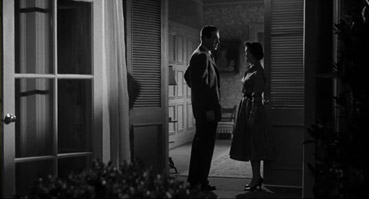
However, I should make clear that while Sirk's films might look pretty on the surface, there's much more on display than glamorous women with lipstick and pincurls beside the handsome men that love or attempt to love them. Like all the great émigré filmmakers – Max Ophuls and Otto Preminger amongst them – German-born Sirk had the outsider's gift of perspective. By living on the margins of American culture, rather than being a part of it, Sirk's films are imbued with a unique kind of social critique, which reaches depths that are often absent from films made by his American peers which cover the similar themes or material, quite simply because in those steps removed, in watching the world through a window or perhaps more accurately a looking glass, Sirk's films have space to breathe, space to look, and space to reflect, unhindered by the constraints of patriotism or romantic nostalgia. However, it's important to note that Sirk was equally as unafraid to turn that critical eye toward his own culture with equal power and prowess, as evidenced in his debut film, the distinctly anti-Nazi, Hitler's Madman. Often, the director's work is quite unfairly judged solely upon the films made during his on the 'golden' run of success he achieved when working for Universal throughout the 1950s.
Again, it's difficult not to draw parallels with Sirk's outsider status and the length of time it took for his work to be truly appreciated, a process which reinforces just how important time and distance is when we look closely and a film or the director's entire oeuvre. Though commercially successful, his melodramas for the company weren't well received by contemporary critics. Often misunderstood and misappropriated, Sirk's features were labelled as 'women's pictures' and therefore considered insignificant, banal and perhaps most cuttingly of all, given the meticulous design and attention to detail found within his productions, unrealistic. As a result, his considerable body of work wasn't fully appreciated and in terms of their artistry or social and artistic value until much later on, by audiences revisiting is work in the 1970s hankering after the exact kind of glamour and escapism I previously described. It's no coincidence that the newfound enjoyment of his films also ran concurrent with a re-evaluation of Sirk's films and the melodrama genre as a whole within academia through the work of writers such as Thomas Elsaesser, and the industry itself, most notably via his fellow director and countryman, Rainer Werner Fassbinder.
In terms of Sirkian chronology, There's Always Tomorrow comes between two more famous and critically-lauded cinematic siblings, All That Heaven Allows and Written on the Wind, but is by no means a poor relation, and packs a hefty emotional punch which rivals Imitation of Life for the heartbreaking and dare I say cruel fate which it's protagonist, successful toy executive Cliff Groves (Fred MacMurray) suffers. Like all of Sirk's work, this film carries an air of tragedy, and you can't help but feel for Cliff from the start, even if his actions through the course of the film do raise questions in regard to morality and social mores which extend far beyond the confines of the 1950s and the notorious hard-line stance of the Hayes code era.
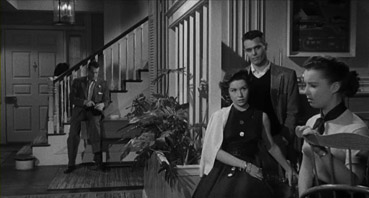
While he's very much in control when in the workplace, the same can't be said for his home life. Far from being the centre of things, Cliff is almost an adjunct, undervalued and ignored at every turn. Wife Marion (Joan Bennett), is entirely preoccupied with the demands of their three children: eldest son Vinnie (Sirk regular William Reynolds), a brooding playboy-in-waiting, with just a hint of James Dean's Rebel allure; Ellen (Gigi Perreau), a typically fashion and gossip obsessed teenager; and youngest daughter Frankie (Judy Nugent), a precious and rather precocious child, with aspirations of becoming a ballet dancer. As many Sirkian children are, the Groves brood are incredibly greedy, unashamedly selfish and wonderfully obnoxious bunch. In fact, they're that unlikeable, aside from Imitation's Sarah Jane (Susan Kohner) or the demanding and self-absorbed princess Veda (Ann Blyth) in Michael Curtiz's Mildred Pierce, you'd be hard-pressed to find more fitting candidates for 'most brattish children ever committed to celluloid.'
Though the Groves are obviously well-off – the presence of housekeeper-turned cook Mrs Rogers (Jane Darwell) acts as the ultimate symbol of wealth – their home is most certainly not a happy one, In fact, the Groves house is effectively a character in its own right, standing as projection of Cliff's thoughts and feelings throughout the film, and I believe, is as important to understanding There's Always Tomorrow as the place and narrative weight conventionally occupied by voiceover narration or the melodrama staple of interior monologue. At first, Cliff's marital home seems the epitome of upscale 1950s suburbia, the American Dream set down in bricks and mortar. It's immaculate and decorous, beautifully shot and lit by cinematographer Russell Metty. I'd argue that Metty's work here is as important to the film's visual style as Sirk's direction, since the photography and composition work in tandem to create the signature Sirkian expressionist look. The large and opulent Groves home dissected and broken down into ever smaller spaces, whether though the use of light and shadow – to an almost noirist degree at certain points – or fences, doors and balustrading, which give the film a palpable sense of the claustrophobia and entombment Cliff feels as he struggles to carry on living the life he finds himself inhabiting.
Life, as the old adage goes, gets in the way of what you want to do, and in Cliff's case, it's never been truer. His fortune's change when leaves a rather dreary, rainy California – only Sirk would dare to undercut the state's world-renowned reputation as hot and sunny with a dose of inclement realism – for nearby Palm Valley in the hopes of securing a lucrative contract for Groves Toys. Whilst waiting for his associate to arrive, he encounters an old friend, and former girlfriend in fashion designer Norma Vale (Barabra Stanwyck, reunited with her Double Indemnity co-star MacMurray for what would be the final time). Cliff's extended stay at the resort with Norma, where the two reconnect is the lightest and most enjoyable section of the film, reminiscent of the earlier screen romances in Nicholas Ray's It Happened One Night, and Vincente Minnelli's The Clock.
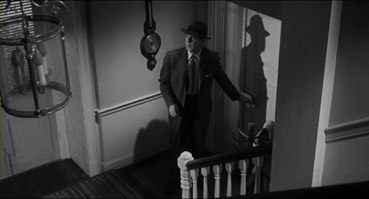
Aside from the obvious blonde versus brunette opposition, Norma and Marion are also poles apart in their appreciation, admiration and support for Cliff and his work. In short, Norma is everything Marion is not; almost full to bursting with vibrancy and ambition. It's only fitting then that in a film which ostensibly explores the disparity between what we wish for ourselves in tomorrows and what we actually get in todays, that Norma is presented as a dream and a fantasy. She's the kind of wife you think Cliff should have instead of the one he's landed with, and he'd get the kind of lovely, perfect life, which dreams and interior design catalogues are made of. Though clearly tinged by memories of youth and the first flush of love, Norma's enthusiasm is infectious. By the time they meet, you're already sold on the idea that Norma and Cliff should be together, and stay by the pool reminiscing and sipping cocktails rather than go back to his stifled existence at home in California. Secretly, and no matter how much we wish it to be true, we know already their relationship is neither attainable nor sustainable. Dreams are dreams for a reason.
The pessimist in me was almost counting the seconds down to when the bubble would burst. As it turned out, I didn't have to wait very long. The classic Sirkian obstacle to happiness comes in the form of son Vinnie. Arriving at the resort with his friend Bob (Race Gentry), and their girlfriends Ann (Pat Crowley) and Ruth (Myrna Hansen) respectively, he unwittingly stumbles upon his father spending time with Norma and all too hastily imagines his way toward a torrid affair, helped along by the equally vivid imagination of Bob. They're barely out of the shadow of the bungalow awnings before he's regaling Vinnie with tales of his adulterous uncle and tarring Cliff with the same brush.
The group leaves as quickly as they came, but you know the damage is already done. When Cliff returns to the family nest, you can almost see the life that Norma injected drain out of him the second he closes the front door and he's brought back down to earth with a hefty bump. What really tugs at the heartstrings however, is Vinnie's incessant pursuit of truth regarding the nature of Cliff and Norma's relationship, even roping in sister Ellen when he's at his most desperate. If Vinnie were doing all of this in order to protect his siblings, his mother and the family unit, then his actions would be entirely honourable. However, his investigations are ultimately motivated by his own feelings rather than those of anyone else. Indeed, his sleuthing almost costs him his own relationship with the progressive and smart Ann, who warns him on countless occasions to leave well enough alone. Just like his father, he's overshadowed by the woman in his life until he learns to appreciate her.
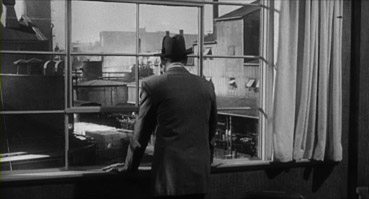
Appreciation, perhaps, is the underlying theme of There's Always Tomorrow, and though the romance between Cliff and Norma is painful in its fleeting nature – the briefest glimpses at unadulterated happiness – it underlines that things happen for a purpose. Though rarely afforded a happy ending, and perpetually thwarted by circumstance, Sirk's characters always grow and always learn, even if the teachings feel rather unjust. For all Tomorrow's opulence and grandiosity, it is, at it's heart, something of realist film, in that it goes to great lengths to reflect the realities of an affair – however brief – and the lasting effect it can have on those around us, popping the usually impenetrable bubble of sweeping screen love stories with a considerable amount of force.
It seems rather a cliché to suggest that this film 'made' by its performances, but definitely accurate here. While a lot of emphasis is placed on the aesthetic of Douglas Sirk's films – because they so obviously revel in the act of looking and seeing, as well as the practice of display and objectification, less is made of the importance of his cast of actors to the viewing experience. Without MacMurray and Stanwyck (and to a lesser degree Bennett), this film wouldn't work half as well as it does. Of course, their chemistry is obvious, but these two actors also exhibit a great deal of skill in their approach toward the material, which further compliments the nuance of Sirk's style. Of course, things momentarily veer into the territory of overwrought, but that's as much a reflection of the genre as it is of acting styles of the period. By this time though, our involvement with Cliff and Norma's predicament is such that they can be afforded a little leeway.
In the cinematic world of Douglas Sirk, everything means something, whether an apron, a family photograph, a lost earring or a miniature toy robot. I firmly believe that this is why his films remain as relevant and as powerful to a modern audience as they did to his audiences in the 1950s. These films might look like pretty antiques, but like all famed relics, Sirk's features carry their own history, their own merit and their own distinctive style that can transcend the period in which they were made. A classic if ever there was one, and quite possibly the best example of a Douglas Sirk film ever made.
A clean 1.85:1 anamorphic transfer that's good on detail but a little heavy on the contrast, giving the image a bold look and rock solid blacks but at the expense of shadow detail, something evident even in sunlit daytime exteriors and that gives the film almost a noir look in places, emphasised by Sirk regular Russell Metty's expressive and expressionistic use of deep shadows and angled highlights. Outside of the blacks, the greyscale tones are well represented and there's no burn-out of whites at the other end of the scale. The film grain is clearly visible throughout.
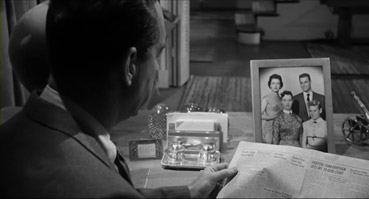
The Dolby 2.0 mono soundtrack is clean and has little in the way of background hiss. They dynamic range is inevitably a little restricted – this is very much a soundtrack of its period – but there's no distortion and the dialogue and music are both clear.
A fine release from Eureka complete with a high-definition transfer and nice batch of extras. In addition, the optional English subtitles are definitely a welcome inclusion, since there are a few moments when dialogue is harder to catch.
Days with Sirk [2008] (60:38)
To describe Cinéaste Pasqual Thomas and film critic Dominque Rabourdin's documentary for French film series Cinéma Cinémas as an archive interview feature would do it a disservice. Indeed, even to call it an interview-turned-retrospective falls short of the mark, and makes it sound rather run-of-the-mill, when it's much more than that. The film is exemplary of what can happen when you combine interview material and archive footage to the best effect.
So often, these kinds of retrospective films can be the epitome of tedium, and descend into a rather vacuous mutual appreciation session. However, Days with Sirk is most definitely an exception. Utilising rare interview footage with Sirk himself taken in 1982, alongside other material which would end up in the final broadcast, this is something of a compliment to the 'Sirk Speaks,' article. A wonderful insight into the man and his work, made with care, an obvious appreciation of and respect for one of cinemas greatest auteurs. If the only Sirk you've seen is the films themselves and the only Sirk you've read is within the confines of academic textbooks, then Days with Sirk will allow you to see his considerable achievements in a new light.
Theatrical Trailer (2:28)
A nice thing to look at from the perspective of marketing and editing. I always enjoy looking at contemporaneous trailers, since they flag up an awful lot about the period in which they're made, and the audience they're made for. Though it has the rather wonderful dramatic and authoritative voiceovers common to trailers of the period, it's worth noting that this isn't the complete trailer as audiences of 1956 would have seen it, since the on screen text is missing. Despite this, it's still great to have it included.
Booklet
Lavishly illustrated with production stills, this rather lovely booklet is dominated by a fascinating study of two sequences in the film by Dr Andrew Klevans (lecturer in Film Studies at the University of Oxford). Excepted from his book, Film Performance: From Achievement to Appreciation, 'A Place to Hide: There's Always Tomorrow' focuses on, as you would expect, textual analysis. While it's sometimes heavy-going – especially if you aren't used to reading this kind of material – it's also a wonderfully written piece and it's certainly worth sticking with, for the sheer level of depth Klevans reaches.
The second half of the booklet is given over to excerpts from 'Sirk Speaks,' an interview from 1977, conducted by Michael Stern and originally appeared in the film journal, Bright Lights. I always enjoy reading interview material, especially with directors, since I find, when done well – as is the case here – they can significantly add to your appreciation and enjoyment of the interviewee's body of work. Having read a lot of the academic material on Sirk before hand, it was a genuine treat to read about his background and experiences, interwoven with his own thoughts and ideas upon melodrama and directorial style. A great read.
As always, the booklet includes production credits for the film. Before viewing, it's also a good idea to read the 'Notes on Viewing' to ensure you're viewing the film in the correct dimensions on a widescreen setup. With visuals like Sirk's on your screen, you won't want to miss anything, so it's work a look before viewing.
Original dialogue and continuity script
Included as a PDF on the disc, this is a nice little surprise amongst an already impressive set of extras. Well worth a read for any aspiring screenwriters or directors.
This powerful, keenly observed drama plays out beautifully. Part personal struggle, part morality tale, part social critique, with just the slightest tinge of noir in its typically lush aesthetic, There's Always Tomorrow may not be the most well-known of Douglas Sirk's output, but it deserves much wider recognition. Eureka's Master's of Cinema series are always of an incredibly high standard, and this is no exception, definitely made with lovers of Douglas Sirk and cinema as a whole in mind. An essential purchase.
|